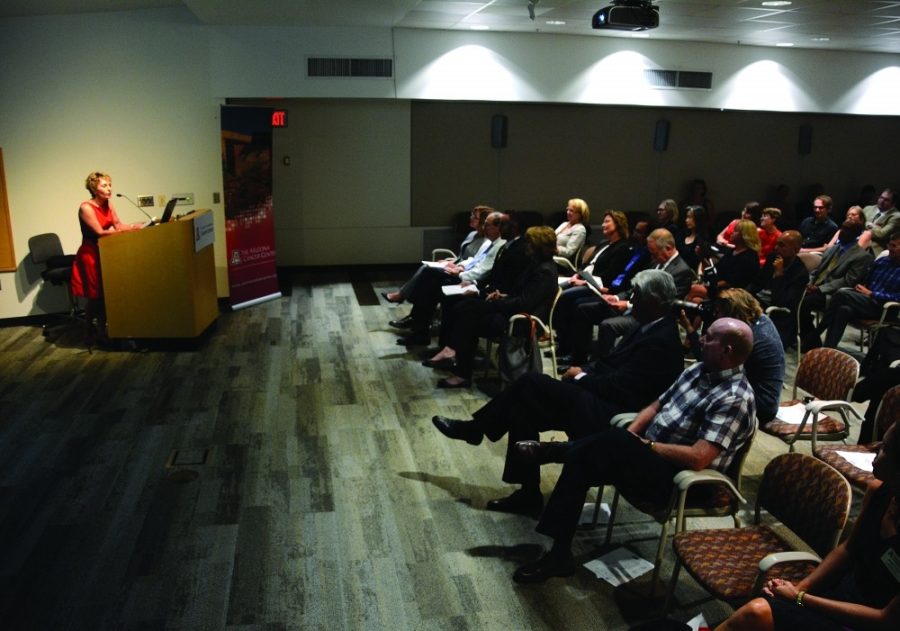The Tucson Jewish Community Center and the UA Cancer Center have teamed up to put on a four-month educational lecture series called “Bear Down. Beat Cancer.”
The series, which is free and open to the public, will cover topics from head and neck cancer to a preventative diet. The lectures will be at the Tucson J, 3800 E. River Rd., Tucson, on the first Thursday of each month, February through May. Each lecture will be will be 45 minutes, with time for questions after, starting at 6:30 p.m.
Amy Dowe, fitness director at the Tucson J, said this lecture series is part of the Tucson J’s long-term goal to bringing people together and provide education and awareness in all areas of health.
“Primarily, we really want to be able to educate the community, make them aware of the knowledge that’s out there,” Dowe said. “We’re always looking to educate the community on different topics, and this one is going to apply to so many people.”
The Tucson J did a lecture series with the Pima Council on Aging, ran a series called “Brain Matters in Neurology” on cognitive topics and worked with the Tucson Orthopaedic Institute for a series on bones, joints and the spine, but Dowe thinks this series on cancer will be of interest to many more people.
RELATED: UA researcher wins grant to study cancer and epigenetics
“I’m feeling very optimistic about the turnout, being that this is something that really affects everybody,” Dowe said. “You’re going to be be able to get a lot of information, whether you have cancer or a friend or family member does.”
Cody Cassidy, director of communications and public affairs at the UA Cancer Center, agreed this topic is broad in its scope.
“Cancer directly affects one in three people,” Cassidy said. “Since a lot of people are affected, it’s a relevant topic, but there’s not a whole lot of information available to the public for those not affected. The idea is to share on a general level what cancer is and what research and treatments are happening.”
Cassidy said the Cancer Center chose to partner with the Tucson J because they saw it as a great way to connect their researchers and clinicians to the community.
“They are a well-respected organization in the community,” Cassidy said. “They do a lot of health and wellness programs, so we’re really working with their efforts.”
Dowe said the Tucson J prides itself on just that.
“A lot of people know the J as being a great center for community, and there’s a lot of knowledge and education here,” Dowe said. “A lot of people come to us to partner with us, to have a place to host these programs.”
The first lecture, on Feb. 2, is called “From Bench to Bedside: Translating Cancer Research into Clinical Patient Care” by Andrew Kraft, director of the UA Cancer Center and associate vice president for UA health sciences oncology programs.
It will focus on how knowledge can be turned into clinical application. Cassidy said getting information about new treatments out to the public is very important, especially with the vast improvements since 1971, when then-President Richard Nixon started his “war on cancer.”
“If you think about how far both science and technology have come along in the past 40 or 50 years, it’s the same thing with cancer treatment and research,” Cassidy said. “We now have a deeper understanding of what cancer is, that cancer is not just one disease but a hundred different diseases. We’ve identified treatments, we’ve developed drugs that can target specific cancers, we’ve developed screening measures and also preventative measures.”
RELATED: Dr. William Cance hired to lead University of Arizona Cancer Center in Phoenix
Partnerships like this start when different organizations reach out to the Tucson J, Dowe said. From there, it’s just planning and logistics.
“We met with the UA Cancer Center, along with their marketing team, to find times and days, and decide what room would work best for this kind of lecture,” Dowe said. “Then they put together who’s going to be speaking when.”
Cassidy called the Tucson J “a great partner,” saying everything has been going smoothly and easily.
Some of that is thanks to Dowe’s experience hosting these type of events. She said the key to a successful series is consistency—doing the lectures on same night, time and location, so people become familiar with it.
“A lot of people come to the first one and then they want to keep coming,” Dowe said. “The only thing we’ve changed with this series is we’re hitting the evening hours as opposed to the early morning hours we usually do, to reach those who have to work.”

Both the Tucson J and the Cancer Center advertise the events, Dowe said.
“They make their flier and we send them our logo to put on it, and we publish it from our end and blast it out to the community,” Dowe said. “They advertise it, we advertise it, it’s a great partnership.”
Dowe said one of the best part about these lectures is how they build on each other.
“The way the Cancer Center laid the series out is that you can drop into any of the lectures, but it’s also progressive,” Dowe said. “You won’t find the same information twice.”
The rest of the lecture schedule can be found here.
Follow Marissa Heffernan on Twitter.









